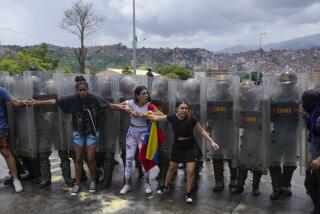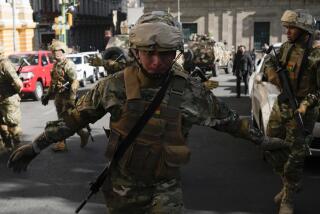Hounduran police, soldiers raid two media outlets
Faced with a barrage of criticism abroad and, more importantly, from allies at home, the de facto president of Honduras, Roberto Micheletti, appeared to retreat Monday from his decision to suspend crucial civil liberties.
Micheletti said he would consult with the Supreme Court and other institutions and hoped to repeal the decree “at the most opportune moment.” He apologized to the Honduran people but again blamed President Manuel Zelaya, the man he ousted in a coup in June, for making drastic measures necessary.
The emergency decree, issued only a day earlier, bans public gatherings, restricts the press and makes it easier for the army to arrest people.
Micheletti’s apparent and abrupt reversal follows unusually pointed criticism from some of his allies and fellow coup backers, including powerful businessmen and politicians. Some have even begun to speak of allowing Zelaya to be reinstated, an idea that has been taboo until now.
Micheletti’s former colleagues in Congress, over whom he presided until they installed him as president as part of the coup, warned him of widespread opposition to the suspension of civil rights.
“We’ve asked him respectfully to analyze the possibility of leaving the decree to one side, as a way to encourage dialogue among the sectors,” said congressional President Jose Angel Saavedra.
Until now, the Congress had stood fairly solidly behind Micheletti and the coup. The disagreements emerging Monday reflected misgivings among some coup backers that Micheletti went too far in suspending constitutional guarantees, especially since he has invoked the constitution to justify removing Zelaya.
The Honduran business elite has become particularly concerned that the country’s isolation is damaging the economy and will imperil elections scheduled for November. The U.S. and other countries have cut off some aid and said they will not recognize the election results unless the crisis is first resolved.
In a potential breakthrough, a leading businessman who supported the coup said Monday that opposition to Zelaya’s return may be easing. Adolfo Facusse, president of the National Industrial Assn., said the business elite wants guarantees that Zelaya’s power would be strictly limited -- a condition Micheletti has rejected.
“In that case we could give the green light to his being reinstated,” Facusse said in an interview.
The de facto government made the emergency decree after accusing Zelaya of inciting violence from his refuge inside the Brazilian Embassy in Tegucigalpa, the Honduran capital. If not rescinded, it would suspend civil liberties for 45 days.
The restrictions then would be lifted just 10 days before the scheduled presidential election. Leading candidates said this would be disastrous for their campaigns.
“Declaring a state of siege is something that should be more carefully analyzed,” said Porfirio Lobo, candidate for the Nationalist Party, which is technically opposed to Micheletti’s Liberal Party but tends to share most positions. “We cannot support it.”
Before Micheletti announced he would reconsider the decree, his government silenced two opposition news broadcasters, appearing bent on clamping down on Zelaya’s backers.
The two targeted stations frequently carry interviews with Zelaya and his supporters -- voices given short shrift in most other Honduran media. Channel 36 television was yanked from the air late Sunday. And soldiers and police launched a predawn raid Monday on Radio Globo, a national broadcaster sympathetic to Zelaya.
Micheletti’s government accused the stations of inciting rebellion on Zelaya’s behalf.
“This is total repression, a desire to silence the people,” said Lenny Fajardo, a reporter for Radio Globo. She said soldiers seized and destroyed equipment in the raid, but employees escaped.
All efforts to mediate the crisis -- by Nobel laureate Oscar Arias, the president of Costa Rica; and the regional Organization of American States -- have failed. The international community demands Zelaya be reinstated, a condition that Micheletti and his allies have adamantly rejected.
Zelaya, who returned to Honduras last week and is holed up in the Brazilian Embassy, had called on his supporters to take to the streets Monday to mark the three-month anniversary of his ouster and carry out what he described as the “final offensive.”
Despite the emergency decree, hundreds of people, including teachers, university students, peasants and union activists, gathered in Tegucigalpa for the march. They were blocked by riot police.
The two groups faced each other for several hours, with some demonstrators chanting slogans in support of Zelaya. Some put tape across their mouths to symbolize censorship.
Eventually, police allowed the demonstrators to march single file to the funeral of a 24-year-old woman who died, the protesters said, after exposure to tear gas fired by troops. She had been asthmatic.
--
Renderos is a special correspondent.
More to Read
Sign up for Essential California
The most important California stories and recommendations in your inbox every morning.
You may occasionally receive promotional content from the Los Angeles Times.











